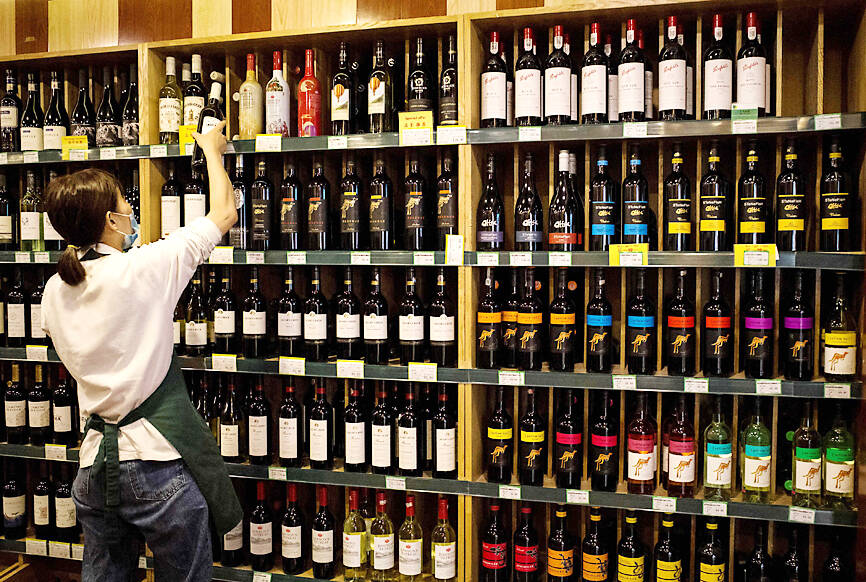China has lifted its punitive tariffs on Australia’s wine exports, signaling an end to a three-year campaign of trade pressure on Canberra and raising hopes for a revival of the billion-dollar industry.
The Chinese Ministry of Commerce announced the move yesterday. The industry has been anticipating the announcement for weeks after some Australian vintners and lawmakers said the Asian nation had made an interim recommendation to lift the import taxes.
“In view of the changes in the relevant wine market conditions in China, it is no longer necessary to impose anti-dumping duties and countervailing duties on imported relevant wines originating in Australia,” the ministry said in a statement.

Photo: AFP
The decision to remove trade curbs has raised hopes of reviving the lucrative wine trade between the two nations, but Australia China Business Council national president David Olsson on Wednesday said that winemakers might not make a full return to the market.
“We expect to see a significant proportion of the wine coming back into China, but not all of it. A lot of it is just looking to other markets,” Olsson told Bloomberg Television.
China imposed tariffs of up to 218 percent on Australian wine in March 2021, after then-Australian prime minister Scott Morrison called for an international probe into the origins of the COVID-19 pandemic. The decision has contributed to a glut that has brought the wine industry to its knees.
China was Australia’s top wine export destination in 2019, accounting for A$1.1 billion (US$714 million).
Relations between the two nations started improving after the May 2022 election of Australian Prime Minister Anthony Albanese’s government, culminating in his visit to Beijing in November last year.
Trade curbs on some other Australian commodities have already been withdrawn. China now accounts for about 90 percent of the nation’s barley exports after tariffs were scrapped in August last year.
Australian businesses are looking forward to China removing restrictions on eight Australian abattoirs and the import of live lobsters, China-Australia Chamber of Commerce chairman Vaughn Barber said last week.
China has not officially acknowledged its restrictions on lobsters from Australia.
Separately, Australia is to invest A$1 billion to ensure more solar panels are made domestically, as the nation looks to reduce its dependence on imports from China.
The Solar Sunshot program is to offer production subsidies and grants to help Australia capture more of the global solar manufacturing supply chain, the government said in a statement.
While Australia has the highest uptake of rooftop solar in the world — with panels on one in three households — just 1 percent of those have been made locally, it said.
China provides more than 90 percent of Australia’s panels.
“Australia should not be the last link in a global supply chain built on an Australian invention,” Albanese said in the statement, referring to pioneering work on the technology at the University of New South Wales.
“We have every metal and critical mineral necessary to be a central player in the net zero transformation, and a proven track record as a reliable energy producer and exporter,” he said.
Global solar supply is facing a crisis after the rapid expansion of plants outpaced demand and squeezed margins, Bloomberg NEF said in a report this month.
About US$78 billion of surplus solar manufacturing capacity could be added through 2027, it said.

Merida Industry Co (美利達) has seen signs of recovery in the US and European markets this year, as customers are gradually depleting their inventories, the bicycle maker told shareholders yesterday. Given robust growth in new orders at its Taiwanese factory, coupled with its subsidiaries’ improving performance, Merida said it remains confident about the bicycle market’s prospects and expects steady growth in its core business this year. CAUTION ON CHINA However, the company must handle the Chinese market with great caution, as sales of road bikes there have declined significantly, affecting its revenue and profitability, Merida said in a statement, adding that it would

Greek tourism student Katerina quit within a month of starting work at a five-star hotel in Halkidiki, one of the country’s top destinations, because she said conditions were so dire. Beyond the bad pay, the 22-year-old said that her working and living conditions were “miserable and unacceptable.” Millions holiday in Greece every year, but its vital tourism industry is finding it harder and harder to recruit Greeks to look after them. “I was asked to work in any department of the hotel where there was a need, from service to cleaning,” said Katerina, a tourism and marketing student, who would

i Gasoline and diesel prices at fuel stations are this week to rise NT$0.1 per liter, as tensions in the Middle East pushed crude oil prices higher last week, CPC Corp, Taiwan (台灣中油) and Formosa Petrochemical Corp (台塑石化) said yesterday. International crude oil prices last week rose for the third consecutive week due to an escalating conflict between Israel and Iran, as the market is concerned that the situation in the Middle East might affect crude oil supply, CPC and Formosa said in separate statements. Front-month Brent crude oil futures — the international oil benchmark — rose 3.75 percent to settle at US$77.01

RISING: Strong exports, and life insurance companies’ efforts to manage currency risks indicates the NT dollar would eventually pass the 29 level, an expert said The New Taiwan dollar yesterday rallied to its strongest in three years amid inflows to the nation’s stock market and broad-based weakness in the US dollar. Exporter sales of the US currency and a repatriation of funds from local asset managers also played a role, said two traders, who asked not to be identified as they were not authorized to speak publicly. State-owned banks were seen buying the greenback yesterday, but only at a moderate scale, the traders said. The local currency gained 0.77 percent, outperforming almost all of its Asian peers, to close at NT$29.165 per US dollar in Taipei trading yesterday. The